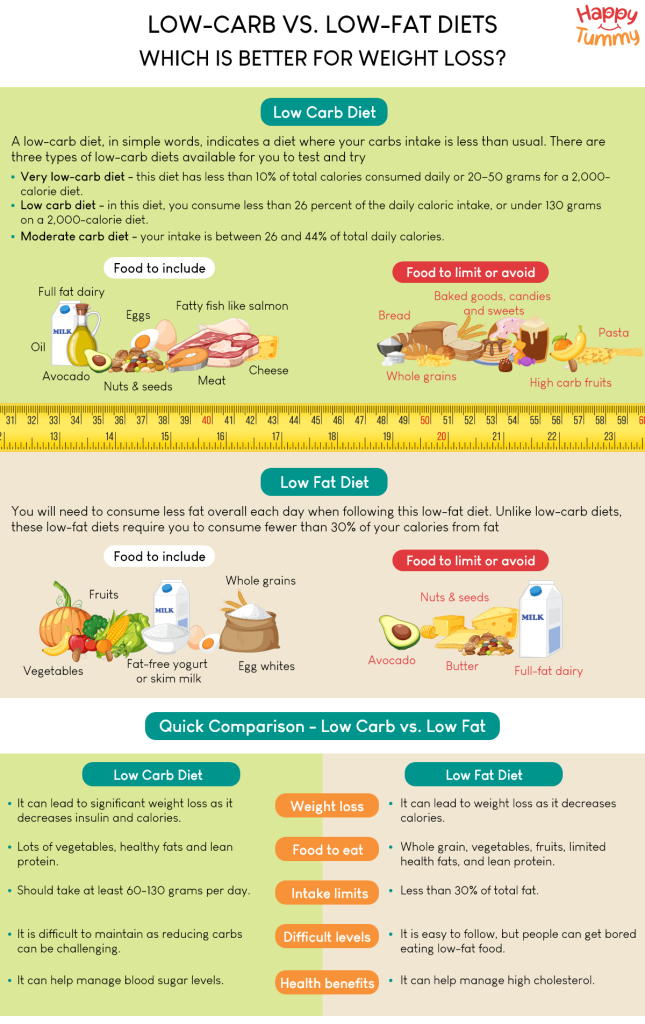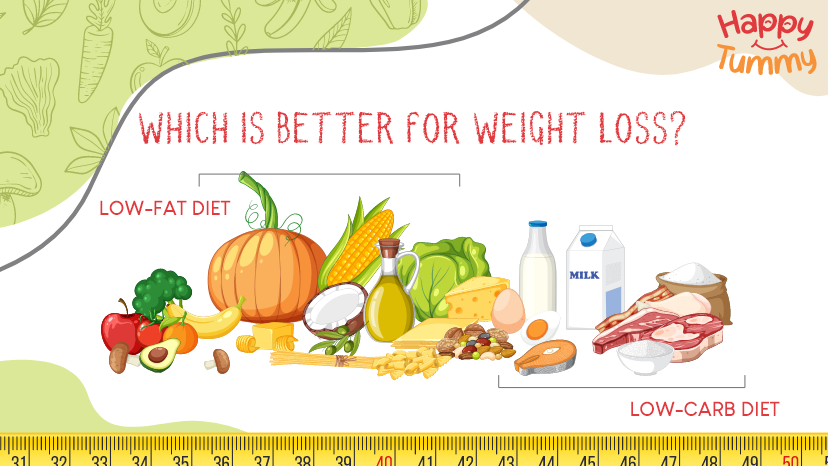Table of Contents
These days, there’s a lot for each of us to look for and discuss. However, have you ever thought about what is currently the most talked about and searched topic? Weight Loss.
If one thing excites people and they look eager to discuss, it is how they can lose some extra kilos. Irrespective of whether someone is overweight or healthy, nobody likes to move away from weight loss discussions.
But how can one make the weight loss journey a success? Which plan, diet, or program can help them achieve their ultimate weight loss goal? Let’s discover the same in this article. Today, we will discuss two diets: Low-Fat and Low-Carb Diet. Each diet has pros and cons and offers optimal health while shedding extra pounds. So, who are the main culprits – carbs behind excess weight, or is fat the dietary villain?
Let’s find out how!
Different Diets – Low Carb and Low Fat
Before deciding which diet is the best, we must understand each diet in detail.
Low Carb Diet
A low-carb diet, in simple words, indicates a diet where your carbs intake is less than usual. There are three types of low-carb diets available for you to test and try [1]:
- Very low-carb diet – this diet has less than 10% of total calories consumed daily or 20–50 grams for a 2,000-calorie diet.
- Low carb diet – in this diet, you consume less than 26 percent of the daily caloric intake, or under 275 grams on a 2,000-calorie diet.
- Moderate carb diet – your intake is between 26 and 44% of total daily calories.
Since each diet is different, the one you should follow initially will also depend on the needs and composition of your body. For example, the extremely low-carbohydrate keto diet is gaining popularity. Reducing carbohydrate intake is a component of the ketogenic diet. The objective is to get the body to enter a metabolic state known as ketosis, in which fat is burnt for energy instead of carbs.
Low Fat Diet
You will need to consume less fat overall each day when following this low-fat diet. Unlike low-carb diets, these low-fat diets require you to consume fewer than 30% of your calories from fat [2].
What Foods Should You Eat and Avoid on a Low-Fat and Low-Carb Diet?
People often find themselves on a diet and unsure of what to eat or avoid.
Consequently, we have created tables to help you understand what you can and cannot eat on each of these diets. It will support you in maintaining a healthy weight and happy tummy.
Low Carb Diet – Foods to include and avoid
| Food to include | Food to limit or avoid |
| Fatty fish like salmon | Baked goods, candies and sweets |
| Eggs | Whole grains |
| Meat | Starchy vegetables |
| Nuts and seeds | Pasta |
| Avocado, Sprouts | Bread |
| Full-fat dairy | Legumes |
| Ghee | High carb fruits |
| Non-starchy vegetables |
Low Fat Diet – Foods to include and avoid
| Food to include | Food to limit or avoid |
| Fruits (except avocado) | Butter |
| Vegetables | Nuts and seeds |
| Egg whites | Avocado |
| Whole grains | Full-fat dairy |
| Legumes | |
| Fat-free yogurt or skim milk are examples of low-fat dairy |
Low-Fat and Low-Carb – Which One is Better?

Numerous factors will determine the ideal diet for you. Before starting with any diet in particular, you must check the benefits and limitations of each one of them. Below are some of the common things to consider, and you can refer to the same when choosing between the two diets.
#1 Low-Fat and Low-Carb for Fat Loss
A lot of research and studies have been conducted related to the impact of diet on the human body. The main thing that is checked in these are the impact of fat loss the diet can provide. A low-carb diet is thought by many to be more successful in encouraging fat reduction than a low-fat diet. [3].
The reason is basically linked with the food that we eat in this diet. Insulin levels are resisted, energy balance is maintained, and metabolism is improved by a low-carb diet. If you are told to cut back on your carbs, your body will start using fat instead of sugar or glucose as its main energy source. This change in metabolism promotes the burning of fat reserves for energy, which helps reduce body fat.
#2 Appetite and Hunger
In the context of weight loss, we frequently discuss managing our cravings and inclination to eat. It implies that we must manage our appetite and hunger. Thus, when comparing these two diets, the low-carb diet is more successful than the low-fat diet [4].
The explanation is rather straightforward. Protein and fat are the foundation of many low-carb diets since they have high satiety levels. As a result, they reduce the likelihood of overindulging or frequent snacking by assisting individuals in feeling full for longer periods of time.
In addition, these low-carb diets frequently restrict or completely cut out processed and sugary meals, which are known to cause cravings. People may have fewer desires if they stay away from these items, making it more straightforward to control their hunger and follow a diet.
#3 Low-Fat and Low-Carb for Optimum Blood Sugar Levels
Every diet plan will have some or the other restrictions one must follow. There is an impact on the various body parts when limitations exist. You may experience jitteriness, abrupt exhaustion, and appetite suppression if your blood sugar levels drop.
Consequently, you should follow a low-carb diet in order to control your blood sugar levels [5]. The main objective of this diet is to consume less carbohydrates, processed sugars, and starches. As a result, the body absorbs less glucose, which leads to more stable and under control blood sugar levels.
Additionally, these low-carb diets have been linked to higher insulin sensitivity or a cell’s ability to use glucose and respond to insulin. Better blood sugar regulation and a decreased likelihood of insulin use could arise from this.
Even better, you can include Aashirvaad sugar release control atta in your diet. It is made of whole wheat and a natural grain mix, such as oats and methi, which helps keep our GI levels in control.
#4 Low-Fat and Low-Carb for Weight Loss
When discussing weight loss, the finest diet that produces results is necessary. If you want to reduce weight quickly, a low-carb diet is the best choice [6]. This is because the body is forced to use glucose instead of fat reserves as an energy source when it consumes fewer carbohydrates.
This metabolic adaptation improves fat burning and aids in weight loss.
Moreover, a link is typically observed between enhanced lean muscle mass retention and low-carb diets. On the other hand, low-fat diets can unintentionally cause a reduction in muscle mass.
Therefore, maintaining a solid and healthy body composition and metabolic rate, along with losing weight, is essential.
Quick Comparison – Low Carb vs. Low Fat
| Low Carb Diet | Low Fat Diet | |
| Weight loss | It can lead to significant weight loss as it decreases insulin and calories. | It can lead to weight loss as it decreases calories. |
| Food to eat | Lots of vegetables, healthy fats and lean protein. | Whole grain, vegetables, fruits, limited health fats, and lean protein. |
| Intake limits | Should take at least 60-130 grams per day. | Less than 30% of total fat. |
| Difficult levels | It is difficult to maintain as reducing carbs can be challenging. | It is easy to follow, but people can get bored eating low-fat food. |
| Health benefits | It can help manage blood sugar levels. | It can help manage high cholesterol. |
Final Thoughts
Any diet, regardless of whether it’s low in fat or carbohydrates, can benefit your health if you adhere to it correctly. Following the recommendations of any diet plan is crucial since they are tailored to the specific needs and requirements of each unique body.
While both diets have demonstrated great efficacy, the low-carb diet is thought to yield superior outcomes. It can aid in fat burning, blood sugar regulation, and hunger suppression.
The optimum diet, however, differs for each individual depending on their goals, lifestyle, and state of health.
In order to create a personalized strategy for your goals and objectives, it is typically advised to speak with or consult with a nutritionist or other healthcare professional prior to starting your journey toward better living.
FAQs
Diets low in fat are less successful than those low in carbs. It also relies on the requirements and preferences of the particular person. As a result, before beginning a diet, one should always ascertain what their body requires.
Cutting on fats and carbs can both result in weight loss. However, which factor will impact an individual’s weight loss will depend on their need. For instance, if someone is obese, they may need to cut more carbs. You can plan your diet according to your BMI index as well.
A low-carb diet is the best choice if you’re trying to reduce weight rapidly and temporarily. The instant cut on carbs can help reduce overall body weight much quicker.
Compared to fats, carbohydrates or carbs are thought to be harmful to the body. Many diseases and disorders are linked to high carbohydrate diets.
When losing weight and following a diet, the first thing that is burned is the carbs. These are the first things your body uses for energy. When carbs are exhausted, the body goes to fat as the energy source.















